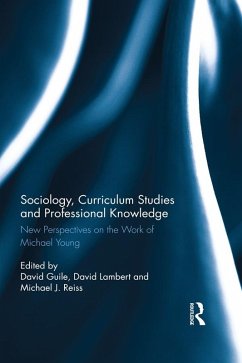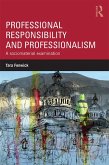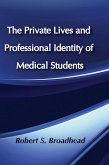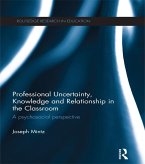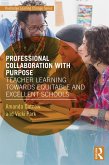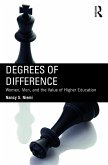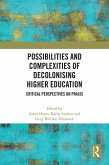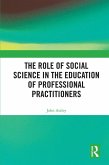Sociology, Curriculum Studies and Professional Knowledge (eBook, PDF)
New Perspectives on the Work of Michael Young
Redaktion: Guile, David; Reiss, Michael J.; Lambert, David
43,95 €
43,95 €
inkl. MwSt.
Sofort per Download lieferbar

22 °P sammeln
43,95 €
Als Download kaufen

43,95 €
inkl. MwSt.
Sofort per Download lieferbar

22 °P sammeln
Jetzt verschenken
Alle Infos zum eBook verschenken
43,95 €
inkl. MwSt.
Sofort per Download lieferbar
Alle Infos zum eBook verschenken

22 °P sammeln
Sociology, Curriculum Studies and Professional Knowledge (eBook, PDF)
New Perspectives on the Work of Michael Young
Redaktion: Guile, David; Reiss, Michael J.; Lambert, David
- Format: PDF
- Merkliste
- Auf die Merkliste
- Bewerten Bewerten
- Teilen
- Produkt teilen
- Produkterinnerung
- Produkterinnerung

Bitte loggen Sie sich zunächst in Ihr Kundenkonto ein oder registrieren Sie sich bei
bücher.de, um das eBook-Abo tolino select nutzen zu können.
Hier können Sie sich einloggen
Hier können Sie sich einloggen
Sie sind bereits eingeloggt. Klicken Sie auf 2. tolino select Abo, um fortzufahren.

Bitte loggen Sie sich zunächst in Ihr Kundenkonto ein oder registrieren Sie sich bei bücher.de, um das eBook-Abo tolino select nutzen zu können.
This volume brings together an international set of contributors in education research, policy and practice to respond to the influence the noted academic Professor Michael Young has had on sociology, curriculum studies and professional knowledge over the past fifty years.
- Geräte: PC
- mit Kopierschutz
- eBook Hilfe
- Größe: 1.26MB
Andere Kunden interessierten sich auch für
![Professional Responsibility and Professionalism (eBook, PDF) Professional Responsibility and Professionalism (eBook, PDF)]() Tara FenwickProfessional Responsibility and Professionalism (eBook, PDF)55,95 €
Tara FenwickProfessional Responsibility and Professionalism (eBook, PDF)55,95 €![The Private Lives and Professional Identity of Medical Students (eBook, PDF) The Private Lives and Professional Identity of Medical Students (eBook, PDF)]() Robert S. BroadheadThe Private Lives and Professional Identity of Medical Students (eBook, PDF)45,95 €
Robert S. BroadheadThe Private Lives and Professional Identity of Medical Students (eBook, PDF)45,95 €![Professional Uncertainty, Knowledge and Relationship in the Classroom (eBook, PDF) Professional Uncertainty, Knowledge and Relationship in the Classroom (eBook, PDF)]() Joseph MintzProfessional Uncertainty, Knowledge and Relationship in the Classroom (eBook, PDF)51,95 €
Joseph MintzProfessional Uncertainty, Knowledge and Relationship in the Classroom (eBook, PDF)51,95 €![Professional Collaboration with Purpose (eBook, PDF) Professional Collaboration with Purpose (eBook, PDF)]() Amanda DatnowProfessional Collaboration with Purpose (eBook, PDF)26,95 €
Amanda DatnowProfessional Collaboration with Purpose (eBook, PDF)26,95 €![Degrees of Difference (eBook, PDF) Degrees of Difference (eBook, PDF)]() Nancy S. NiemiDegrees of Difference (eBook, PDF)42,95 €
Nancy S. NiemiDegrees of Difference (eBook, PDF)42,95 €![Possibilities and Complexities of Decolonising Higher Education (eBook, PDF) Possibilities and Complexities of Decolonising Higher Education (eBook, PDF)]() Possibilities and Complexities of Decolonising Higher Education (eBook, PDF)40,95 €
Possibilities and Complexities of Decolonising Higher Education (eBook, PDF)40,95 €![The Role of Social Science in the Education of Professional Practitioners (eBook, PDF) The Role of Social Science in the Education of Professional Practitioners (eBook, PDF)]() John AstleyThe Role of Social Science in the Education of Professional Practitioners (eBook, PDF)42,95 €
John AstleyThe Role of Social Science in the Education of Professional Practitioners (eBook, PDF)42,95 €-
-
-
This volume brings together an international set of contributors in education research, policy and practice to respond to the influence the noted academic Professor Michael Young has had on sociology, curriculum studies and professional knowledge over the past fifty years.
Dieser Download kann aus rechtlichen Gründen nur mit Rechnungsadresse in A, B, BG, CY, CZ, D, DK, EW, E, FIN, F, GR, HR, H, IRL, I, LT, L, LR, M, NL, PL, P, R, S, SLO, SK ausgeliefert werden.
Produktdetails
- Produktdetails
- Verlag: Taylor & Francis eBooks
- Seitenzahl: 306
- Erscheinungstermin: 7. August 2017
- Englisch
- ISBN-13: 9781317198192
- Artikelnr.: 49040716
- Verlag: Taylor & Francis eBooks
- Seitenzahl: 306
- Erscheinungstermin: 7. August 2017
- Englisch
- ISBN-13: 9781317198192
- Artikelnr.: 49040716
- Herstellerkennzeichnung Die Herstellerinformationen sind derzeit nicht verfügbar.
David Guile is Professor of education and work at the UCL Institute of Education, University of London, UK. David Lambert is Professor of geography education at the UCL Institute of Education, University of London, UK. Michael Reiss is Professor of science education at the UCL Institute of Education, University of London, UK.
1. Consistency, contradiction and ceaseless enquiry in the work of Michael
Young Section 1: Sociology of Education 2. Taking subject knowledge out and
putting it back in again? A journey in the company of Michael Young 3. The
New Organon of Michael Young 4. 'Beyond the present and the particular':
Similarities and differences between Michael Young's and Charles Bailey's
arguments for the public provision of liberating forms of education for all
5. Powerful sociological knowledge? An analysis of the British Sociological
Association and the sociology school curriculum in England 6. A Durkeimian
approach to knowledge and democracy 7. What is educationally worthwhile
knowledge? Revisiting the case for powerful knowledge 8. Michael Young's
influence on the sociology of education Section 2: Curriculum Studies 9.
Michael Young and the crises of capitalism 10. The curriculum arguments of
Michael Young and John White 11. The road to Future 3: The case of
geography 12. Powerful knowledge and the formal curriculum 13. Powerful
knowledge - moving us all forwards or backwards? 14. 'Making' and 'taking'
problems: The curriculum field and Michael Young Section 3:
Professional/Vocational Knowledge and Education 15. Professional knowledge
in the 21st century: 'Immaterial' labour and its challenge for the
'trinary' 16. From the 'general' to the 'organic' intellect: Reflections on
the concepts of specialization and the curriculum of the future 17.
Learning from qualification reform: The value and limitations of the notion
of powerful knowledge 18. Theorising the conditions for theoretical
knowledge in vocational education 19. Conceptualising vocational knowledge:
The high road and the middle road Section 4 20. An appreciation and a
response 21. Coda
Young Section 1: Sociology of Education 2. Taking subject knowledge out and
putting it back in again? A journey in the company of Michael Young 3. The
New Organon of Michael Young 4. 'Beyond the present and the particular':
Similarities and differences between Michael Young's and Charles Bailey's
arguments for the public provision of liberating forms of education for all
5. Powerful sociological knowledge? An analysis of the British Sociological
Association and the sociology school curriculum in England 6. A Durkeimian
approach to knowledge and democracy 7. What is educationally worthwhile
knowledge? Revisiting the case for powerful knowledge 8. Michael Young's
influence on the sociology of education Section 2: Curriculum Studies 9.
Michael Young and the crises of capitalism 10. The curriculum arguments of
Michael Young and John White 11. The road to Future 3: The case of
geography 12. Powerful knowledge and the formal curriculum 13. Powerful
knowledge - moving us all forwards or backwards? 14. 'Making' and 'taking'
problems: The curriculum field and Michael Young Section 3:
Professional/Vocational Knowledge and Education 15. Professional knowledge
in the 21st century: 'Immaterial' labour and its challenge for the
'trinary' 16. From the 'general' to the 'organic' intellect: Reflections on
the concepts of specialization and the curriculum of the future 17.
Learning from qualification reform: The value and limitations of the notion
of powerful knowledge 18. Theorising the conditions for theoretical
knowledge in vocational education 19. Conceptualising vocational knowledge:
The high road and the middle road Section 4 20. An appreciation and a
response 21. Coda
1. Consistency, contradiction and ceaseless enquiry in the work of Michael
Young Section 1: Sociology of Education 2. Taking subject knowledge out and
putting it back in again? A journey in the company of Michael Young 3. The
New Organon of Michael Young 4. 'Beyond the present and the particular':
Similarities and differences between Michael Young's and Charles Bailey's
arguments for the public provision of liberating forms of education for all
5. Powerful sociological knowledge? An analysis of the British Sociological
Association and the sociology school curriculum in England 6. A Durkeimian
approach to knowledge and democracy 7. What is educationally worthwhile
knowledge? Revisiting the case for powerful knowledge 8. Michael Young's
influence on the sociology of education Section 2: Curriculum Studies 9.
Michael Young and the crises of capitalism 10. The curriculum arguments of
Michael Young and John White 11. The road to Future 3: The case of
geography 12. Powerful knowledge and the formal curriculum 13. Powerful
knowledge - moving us all forwards or backwards? 14. 'Making' and 'taking'
problems: The curriculum field and Michael Young Section 3:
Professional/Vocational Knowledge and Education 15. Professional knowledge
in the 21st century: 'Immaterial' labour and its challenge for the
'trinary' 16. From the 'general' to the 'organic' intellect: Reflections on
the concepts of specialization and the curriculum of the future 17.
Learning from qualification reform: The value and limitations of the notion
of powerful knowledge 18. Theorising the conditions for theoretical
knowledge in vocational education 19. Conceptualising vocational knowledge:
The high road and the middle road Section 4 20. An appreciation and a
response 21. Coda
Young Section 1: Sociology of Education 2. Taking subject knowledge out and
putting it back in again? A journey in the company of Michael Young 3. The
New Organon of Michael Young 4. 'Beyond the present and the particular':
Similarities and differences between Michael Young's and Charles Bailey's
arguments for the public provision of liberating forms of education for all
5. Powerful sociological knowledge? An analysis of the British Sociological
Association and the sociology school curriculum in England 6. A Durkeimian
approach to knowledge and democracy 7. What is educationally worthwhile
knowledge? Revisiting the case for powerful knowledge 8. Michael Young's
influence on the sociology of education Section 2: Curriculum Studies 9.
Michael Young and the crises of capitalism 10. The curriculum arguments of
Michael Young and John White 11. The road to Future 3: The case of
geography 12. Powerful knowledge and the formal curriculum 13. Powerful
knowledge - moving us all forwards or backwards? 14. 'Making' and 'taking'
problems: The curriculum field and Michael Young Section 3:
Professional/Vocational Knowledge and Education 15. Professional knowledge
in the 21st century: 'Immaterial' labour and its challenge for the
'trinary' 16. From the 'general' to the 'organic' intellect: Reflections on
the concepts of specialization and the curriculum of the future 17.
Learning from qualification reform: The value and limitations of the notion
of powerful knowledge 18. Theorising the conditions for theoretical
knowledge in vocational education 19. Conceptualising vocational knowledge:
The high road and the middle road Section 4 20. An appreciation and a
response 21. Coda
